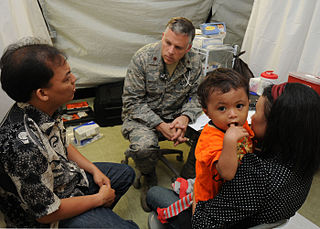Dying is the final stage of life which will eventually lead to death. Diagnosing dying is a complex process of clinical decision-making, and most practice checklists facilitating this diagnosis are based on cancer diagnoses.
Palliative care is an interdisciplinary medical caregiving approach aimed at optimizing quality of life and mitigating suffering among people with serious, complex, and often terminal illnesses. Within the published literature, many definitions of palliative care exist. The World Health Organization (WHO) describes palliative care as "an approach that improves the quality of life of patients and their families facing the problems associated with life-threatening illness, through the prevention and relief of suffering by means of early identification and impeccable assessment and treatment of pain and other problems, physical, psychosocial, and spiritual". In the past, palliative care was a disease specific approach, but today the WHO takes a broader patient-centered approach that suggests that the principles of palliative care should be applied as early as possible to any chronic and ultimately fatal illness. This shift was important because if a disease-oriented approach is followed, the needs and preferences of the patient are not fully met and aspects of care, such as pain, quality of life, and social support, as well as spiritual and emotional needs, fail to be addressed. Rather, a patient-centered model prioritizes relief of suffering and tailors care to increase the quality of life for terminally ill patients.
Terminal illness or end-stage disease is a disease that cannot be cured or adequately treated and is expected to result in the death of the patient. This term is more commonly used for progressive diseases such as cancer, dementia or advanced heart disease than for injury. In popular use, it indicates a disease that will progress until death with near absolute certainty, regardless of treatment. A patient who has such an illness may be referred to as a terminal patient, terminally ill or simply as being terminal. There is no standardized life expectancy for a patient to be considered terminal, although it is generally months or less. Life expectancy for terminal patients is a rough estimate given by the physician based on previous data and does not always reflect true longevity. An illness which is lifelong but not fatal is a chronic condition.
Psychiatric nursing or mental health nursing is the appointed position of a nurse that specialises in mental health, and cares for people of all ages experiencing mental illnesses or distress. These include: neurodevelopmental disorders, schizophrenia, schizoaffective disorder, mood disorders, addiction, anxiety disorders, personality disorders, eating disorders, suicidal thoughts, psychosis, paranoia, and self-harm.

Self-care has been defined as the process of establishing behaviors to ensure holistic well-being of oneself, to promote health, and actively manage illness when it occurs. Individuals engage in some form of self-care daily with food choices, exercise, sleep, reading and dental care. Self-care is not only a solo activity as the community—a group that supports the person performing self-care—overall plays a large role in access to, implementation of, and success of self-care activities.
Compassion fatigue is an evolving concept in the field of traumatology. The term has been used interchangeably with secondary traumatic stress (STS), which is sometimes simply described as the negative cost of caring. Secondary traumatic stress is the term commonly employed in academic literature, although recent assessments have identified certain distinctions between compassion fatigue and secondary traumatic stress (STS).

Spiritual philosophy is any philosophy or teaching that pertains to spirituality. It may incorporate religious or esoteric themes. It can include any belief or thought system that embraces the existence of a reality that cannot be physically perceived. Concepts of spiritual philosophy are not universal and differ depending on one’s religious and cultural backgrounds. Spiritual philosophy can also be solely based on one’s personal and experiential connections.
Faith Community Nursing, also known as Parish Nursing, Parrish Nursing, Congregational Nursing or Church Nursing, is a movement of over 15,000 registered nurses, primarily in the United States. There are also Parish nurses in Australia, the Bahamas, Canada, England, Ghana, India, Kenya, Korea, Madagascar, Malawi, Malaysia, New Zealand, Nigeria, Palestine, Pakistan, Scotland, Singapore, South Africa, Swaziland, Ukraine, Wales, Zambia and Zimbabwe. Faith community nursing is a practice specialty that focuses on the intentional care of the spirit, promotion of an integrative model of health and prevention and minimization of illness within the context of a community of faith. The intentional integration of the practice of faith with the practice of nursing so that people can achieve wholeness in, with, and through the population which faith community nurses serve.
Patient advocacy is a process in health care concerned with advocacy for patients, survivors, and caregivers. The patient advocate may be an individual or an organization, concerned with healthcare standards or with one specific group of disorders. The terms patient advocate and patient advocacy can refer both to individual advocates providing services that organizations also provide, and to organizations whose functions extend to individual patients. Some patient advocates are independent and some work for the organizations that are directly responsible for the patient's care.
Kenneth I. Pargament is an emeritus professor of psychology at Bowling Green State University.
End-of-life care refers to health care provided in the time leading up to a person's death. End-of-life care can be provided in the hours, days, or months before a person dies and encompasses care and support for a person's mental and emotional needs, physical comfort, spiritual needs, and practical tasks.

The philosophy of healthcare is the study of the ethics, processes, and people which constitute the maintenance of health for human beings. For the most part, however, the philosophy of healthcare is best approached as an indelible component of human social structures. That is, the societal institution of healthcare can be seen as a necessary phenomenon of human civilization whereby an individual continually seeks to improve, mend, and alter the overall nature and quality of their life. This perennial concern is especially prominent in modern political liberalism, wherein health has been understood as the foundational good necessary for public life.
Rainbow Hospice and Palliative Care, founded in 1981, is one of the oldest and largest non-profit hospice and palliative care providers in Illinois.
Hospice care is a type of health care that focuses on the palliation of a terminally ill patient's pain and symptoms and attending to their emotional and spiritual needs at the end of life. Hospice care prioritizes comfort and quality of life by reducing pain and suffering. Hospice care provides an alternative to therapies focused on life-prolonging measures that may be arduous, likely to cause more symptoms, or are not aligned with a person's goals.
In Islam, nurses provide healthcare services to patients, families and communities as a manifestation of love for Allah and Muhammad. The nursing profession is not new to Islam. Islamic traditions include sympathy for and responsibility toward those in need. This perspective had emerged during the development of Islam as a religion, culture, and civilization.

Holistic nursing is a way of treating and taking care of the patient as a whole body, which involves physical, social, environmental, psychological, cultural and religious factors. There are many theories that support the importance of nurses approaching the patient holistically and education on this is there to support the goal of holistic nursing. The important skill to be used in holistic nursing would be communicating skills with patients and other practitioners. This emphasizes that patients being treated would be treated not only in their body but also their mind and spirit.. Holistic nursing is a nursing speciality concerning the integration of one's mind, body, and spirit with his or her environment. This speciality has a theoretical basis in a few grand nursing theories, most notably the science of unitary human beings, as published by Martha E. Rogers in An Introduction to the Theoretical Basis of Nursing, and the mid-range theory Empowered Holistic Nursing Education, as published by Dr. Katie Love. Holistic nursing has gained recognition by the American Nurses Association (ANA) as a nursing specialty with a defined scope of practice and standards. Holistic nursing focuses on the mind, body, and spirit working together as a whole and how spiritual awareness in nursing can help heal illness. Holistic medicine focuses on maintaining optimum well-being and preventing rather than just treating disease.
Scholarly studies have investigated the effects of religion on health. The World Health Organization (WHO) discerns four dimensions of health, namely physical, social, mental, and spiritual health. Having a religious belief may have both positive and negative impacts on health and morbidity.
Spirituality affects both mental and physical health outcomes in the general United States population across different ethnic groups. Because of the nuanced definitions of spirituality and religiosity, the literature on spirituality is not consistent in definitions or measures resulting in a lack of coherence. However, taken as a whole, research tends to show that the effect of spirituality is positive, associated with better health outcomes. For those who engage in spirituality, it may serve as a buffer from negative life events, often moderating the relationship between negative life experiences and levels of anxiety or depression. The exception is when negative spiritual coping is practiced. This type of coping has negative health implications.

Cultural competence in healthcare refers to the ability for healthcare professionals to demonstrate cultural competence toward patients with diverse values, beliefs, and feelings. This process includes consideration of the individual social, cultural, and psychological needs of patients for effective cross-cultural communication with their health care providers. The goal of cultural competence in health care is to reduce health disparities and to provide optimal care to patients regardless of their race, gender, ethnic background, native languages spoken, and religious or cultural beliefs. Cultural competency training is important in health care fields where human interaction is common, including medicine, nursing, allied health, mental health, social work, pharmacy, oral health, and public health fields.
The Filipino American identity comprises principles from both the Philippines and the United States. Although the meaning of identity differs from one individual to another, the fundamental factors are the same. History, genetics, socio-economic status, culture, and education are all indirect factors that influences the identity of an ethnic group; thus, they are also reflective of a group's health beliefs and practices.




